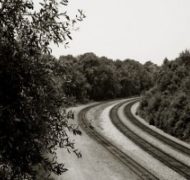Walking the Line Backward and Forward
Blog / Produced by The High Calling
The oldest man I ever knew was Brother Spencer. He was 98 when he died, and I wasn't 16. In his life, he saw nearly one hundred years of the Spokane River Valley on the Washington-Idaho border. He grew up in the same farmhouse he later died in. Post Falls, where we both grew up, wasn’t yet actualized when he was a child. Instead, Huetter was the major town in the area, later overshadowed by Post Falls and the lakeside resort community, Coeur d'Alene, to which a train ride cost fifteen cents.
He was a staple member of our congregation, gnarled and bent like a great oak tree out of season. His hands were enormous and spotted, his eyes kind. He sat in our church with a young couple. They had to be late into their twenties, maybe edging into their thirties, with two kids of their own. These were his grandchildren. Not the kids, the adults—his grandson and his grandson's wife. Some Sundays, when I was nine or ten, I sat next to them, operating the overhead projector during the service; I could not fathom the concept of fathering one generation, much less seeing three more.
Lately I've found myself spending more time wondering about my future. Fantasizing might be a better word. Maybe it's watching the families at church, the kids running in the sanctuary, the babies swaddled in bjorns, mother, father. Adorable Bellingham families, the kind that make your heart hurt. I stray a bit from my usual daydreams, the ones in which I become a famous writer. Instead, I'm everyman. A father, a husband, I spend most of my time with my loving wife and three children, passing our days playing in Elizabeth Park, shopping at the food co-op, or visiting friends around town. I still work at Village Books, and bring home a new picture book whenever I can.
Here, the daydream usually turns fuzzy. I shouldn't be allowed to have friends older than me, friends who are married or have kids. When I'm around them, all I can think about is what my life might look like as a husband or father. But it's only a picture, there's no actual life behind it because I haven't been there yet.
I worked at a bookstore with a woman who was early into her thirties and mother to a ten-year-old boy. When I told her that the Counting Crows song on the radio reminded me of junior high, she scoffed. She was long out of high school by then, years she was out cruising with her friends while I was still likely wetting the bed. Later, Billy Joel came on. "I bet this reminds you of the womb,” she told me. I didn't laugh.
For someone who never gave much thought to family, outside the one I grew up in, thinking about future generations of my family makes me feel older than I remember myself being. Then I get a "you weren't even born when this pop culture reference was relevant" joke, and remember my age. I remember myself as too young and consider marriage and children as things other people do. I'm much too immature and selfish and isolated to have relationships or responsibilities like those. That I'm thinking of these things at all is more confusing for me than anything I might have experienced in puberty.
I checked the Internet to find that the town of Huetter charted a population of 96 citizens at the time of Brother Spencer's death. His town might not have grown, but so much changed since 1904. It's hard for me to believe he never left home. In a life so long, I imagine you learn how to temper the new things with the old experiences. After a runaway wife, 5 sons, 16 grandchildren, 30 great-grandchildren, and 3 great-great-grandchildren; working on the railroad, building a church, and tending his own farm; growing older must have become a small wonder to Brother Spencer. At some point, I'd venture, he stopped paying them much heed.
Transitioning isn't something I'm particularly adept at, so I try to ground myself in the common, everyday tasks—my way of insulating myself from the unfamiliar. And when it comes to commitment, well, I'd rather ease into maturity, some parts lagging behind the others. Forward remains the direction I cast my gaze, keeping backward as my gauge for how far I’ve come.
Railway photo by Kelly Langner Sauer. Used with permission. Post by David K. Wheeler.




